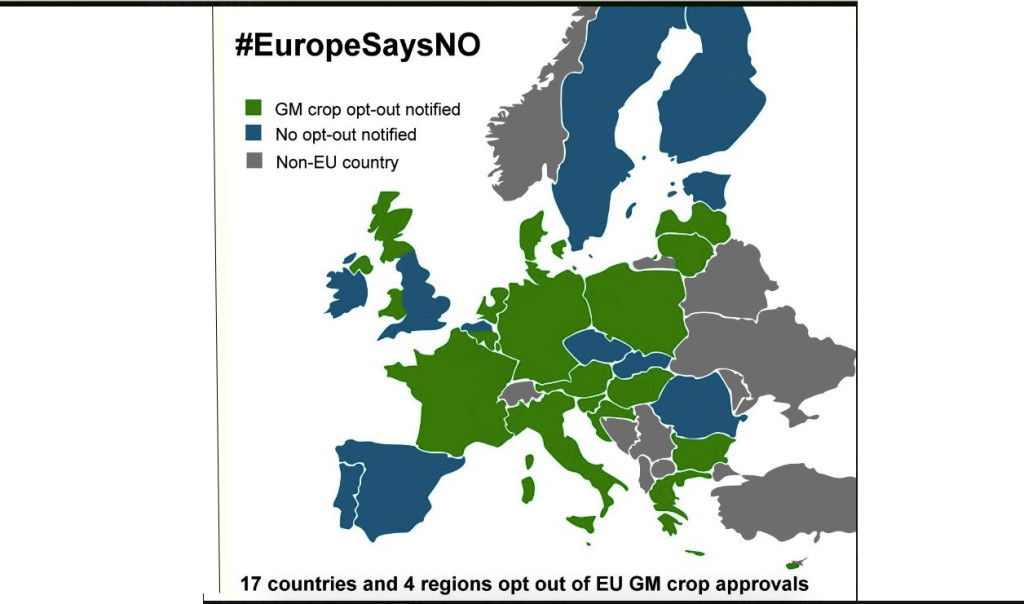. SUSTAINABLE DEVELOPMENT .
An article by Greenpeace
In the latest blow to the European Commission’s laissez-faire approach to GM crops, 17 EU countries and four regions (in two other countries) are in the process of banning the cultivation of GM crops on their territories. On 5 October, 17 EU countries (Austria, Bulgaria, Croatia, Cyprus, Denmark, France, Germany, Greece, Hungary, Italy, Latvia, Lithuania, Luxembourg, Malta, the Netherlands, Poland and Slovenia) and four regional administrations (Scotland, Wales and Northern Ireland in the UK, and Wallonia in Belgium) had notified the Commission of their intention to ban GM crop cultivation under new EU rules [1].

Click on photo to enlarge
This brings the total number of countries who have already declared their intention to put in place GM crop bans to 17 – plus four regions – representing over 65 per cent of the EU’s population and 65 per cent of its arable land (for detailed figures please see this table: bit.ly/1OhTApm).
The bans currently notified apply to the only GM crop currently approved for cultivation in Europe – Monsanto’s pesticide-producing GM maize, known as MON810 – but also to the seven GM crops awaiting approval by the Commission [2]. These are all GM maizes [3].
Nine EU countries (Austria, Bulgaria, France, Germany, Greece, Hungary, Italy, Luxembourg and Poland) had previously banned cultivation of MON810 under so-called safeguard clauses.
Greenpeace EU food policy director Franziska Achterberg said: “A clear majority of the EU’s governments are rejecting the Commission’s drive for GM crop approvals. They don’t trust EU safety assessments and are rightly taking action to protect their agriculture and food. The only way to restore trust in the EU system now is for the Commission to hit the pause button on GM crop approvals and to urgently reform safety testing and the approval system.”
In July 2014, Commission president Jean-Claude Juncker said that the Commission should not be able to force through GM crops against a majority of EU countries [4]. The Commission is yet to deliver a legislative proposal that can achieve this. A revised EU risk assessment scheme, called for by EU environment ministers in 2008, has similarly not been implemented. Current risk assessments by the EU’s food safety authority also ignore EU rules in place since 2001 (Directive 2001/18) for more in-depth and independent testing of GM crops.
(Continued on right side of page)
What is the relation between the environment and peace?
(Article continued from left side of page)
Notes:
[1] Under EU Directive 2015/412, governments can ask biotech companies whose GM crops have already been authorised for cultivation in the EU, or are pending approval, not to market their crops on their territory. The companies – Dow, Monsanto, Syngenta and Pioneer – can then accept or refuse these opt-outs, without having to justify their response. Governments can also legislate to ban individual or groups of GM crops approved in the EU. The Commission list of notifications for national bans: http://ec.europa.eu/food/plant/gmo/new/authorisation/cultivation/geographical_scope_en.htm.
[2] Denmark and Luxembourg are so far requesting bans for MON810 and only three other GM crops pending approval.
[3] The pending authorisations include Pioneer’s pesticide-producing GM maize, known as 1507, whose EU approval was opposed by 19 out of 28 EU countries in February 2014: http://www.greenpeace.org/eu-unit/en/News/2014/Record-number-of-EU-countries-opposes-Commission-plan-to-allow-pesticide-producing-GM-maize.
[4] Juncker said: “[I] would not want the Commission to be able to take a decision when a majority of Member States has not encouraged it to do so”: Political Guidelines for the next European Commission (July 2014): http://ec.europa.eu/priorities/docs/pg_en.pdf